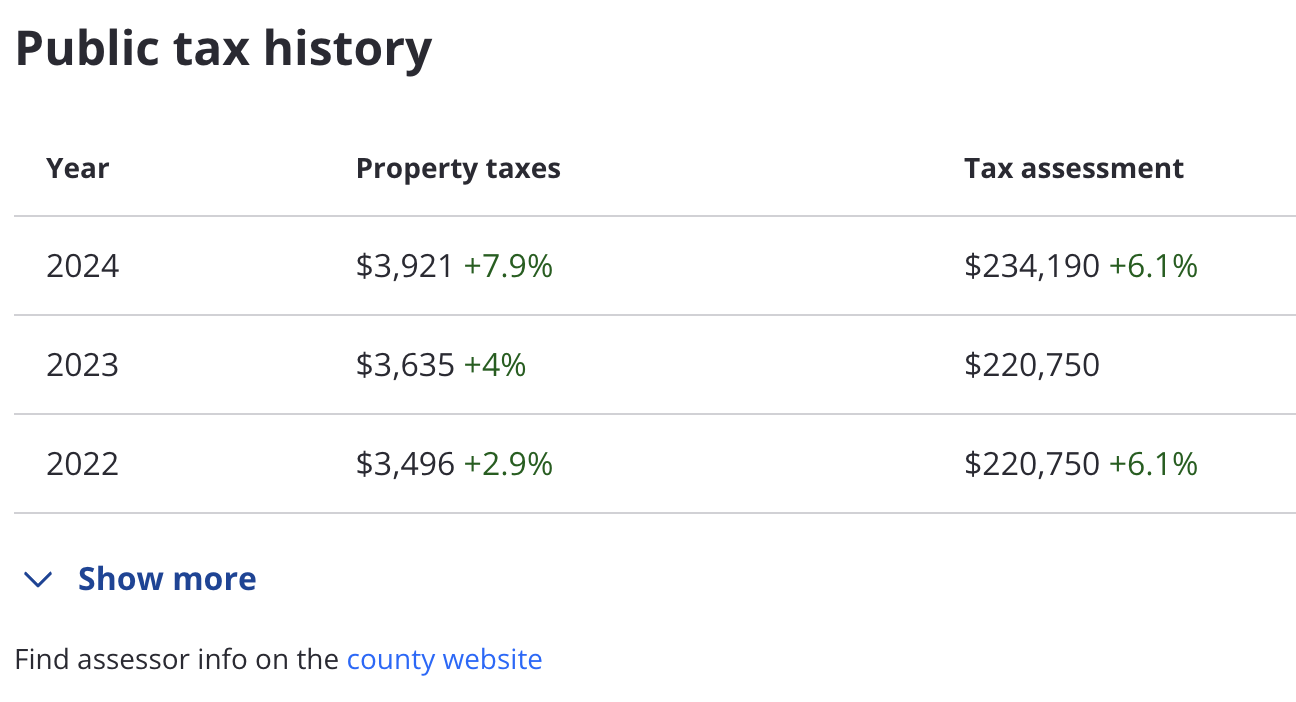What Does Assessed Value Mean?


Written by Vivian Tejada on March 7, 2025
Edited by Jessica Rapp
Assessed value is the dollar amount a local government assigns to a property for tax purposes. It's also known as a property's tax value or tax assessed value.
Local governments use assessed values to determine how much a homeowner has to pay in property taxes in any given year. The higher the property’s assessed value, the more you may pay in property taxes.
Local tax assessors are responsible for determining assessed values on properties in their jurisdiction. They are usually updated once a year.
How to find the assessed value of a property
You can look up your home’s current assessed value by using the property search feature on your local property tax assessor’s website. Those sites differ on how they allow you to search, but you can often search by name, address, parcel number or property name.
Zillow also publishes tax assessed values for most properties on their home detail page. To find tax assessments, search for a home on Zillow, select a property, and look for the section called “Public Tax History.” It looks like this:

There, you’ll find the assessed value based on public records. Just below where it says “show more,” you may see a link that will take you to the public website for the local agency that determines assessments. (Not every property has a link to the website, but it’s a good shortcut to use if it’s there, and you need a precise, official assessment of your property.)
What impacts assessed value?
Various things are taken into account when an assessment is made, including market conditions, comparable sales, and local property values. Property features and characteristics, including the home’s condition, could also impact a tax assessor’s evaluation. Some assessors will use the market value as the assessed value or combine the market value with an assessment rate to calculate your property’s assessed value. Major renovations, such as kitchen upgrades, bathroom additions, or significant structural changes, can improve a home’s market value. Because of this, the assessed value may also be impacted.
Exterior improvements that enhance curb appeal, such as landscaping or pool installations, could also impact assessed value, but it ultimately depends on the tax assessor.
Assessed value vs. appraised value
You might confuse your home’s assessed value with its appraised value, but they’re different. A home’s assessed value is determined by your local tax authority and is used to calculate property taxes owed to the local government. A home’s appraised value is determined by a licensed appraiser, usually for the purposes of getting a mortgage or refinancing one. Home insurance providers may also use appraised value when determining replacement value.
Assessed value vs. market value
Assessed value is also not the same thing as fair market value. Fair market value is the price the property could sell for under current market conditions. Sometimes a property’s market value and assessed value will align, but that’s not always the case. Certain market activity, such as bidding wars or recessions, can impact a home's market value. Bidding wars often drive up market values, while recessions typically reduce demand and lower property values.
How to calculate assessed value
Each state sets its own assessment rate, which is the share of a property’s market value that is taxable. Some states use the market value as the assessed property value, while others multiply the market value by the assessment rate to determine a property’s assessed value. Properties are typically assessed at the county level by a local county tax assessor.
Mississippi has one of the lowest assessment rates in the country at 10%, while Massachusetts has one of the highest rates at 100%. Here’s an example of how these values are used to calculate a property’s assessed value.
Assessed value example
Let’s assume that your home has a market value of $450,000 and the local tax assessment rate is 80%. That means that your tax rate will be based on 80% of $450,000. In this example, your home’s assessed value would be $360,000 ($450,000 x 0.8 = $360,000). When calculating property taxes on your home, the tax assessors would base their calculations on your home’s $360,000 assessed value, not the full $450,000 market value.
Get a quick estimate of your property taxes.
Why is assessed value important?
Assessed value is important, because it determines how much you owe in property taxes. It also plays a major role in determining the amount of property insurance coverage you need. Although market and appraised values are important for determining how much a home is worth, they’re not as stable or updated as frequently as assessed values.
A home’s market value can change quickly due to bidding wars, economic downturns, or other market activity. A home’s appraised value is more comprehensive, but homes are only appraised when the owner needs to sell or refinance. Assessed values are less volatile and more frequently assigned, making them a more reliable value for calculating property taxes and property insurance.
Understanding your home’s assessed value can help you budget and plan for future expenses, because property taxes are paid every year. Also, assessed values give homeowners a rough estimate of what their home could be worth. This can be helpful when trying to determine property values without an appraisal, or when trying to sell in a buyer’s market. Learn more about your selling options.
Ready for a new address?
Get an instant cash offer or list with a local partner agent.
Explore selling optionsRelated Articles
Sell your home with a winning strategy
Here’s how to maximize your home sale with the right selling plan.

Build a smart selling plan
Talk to your agent about their marketing approach - especially online - to ensure you’re getting the best possible price for your home.



